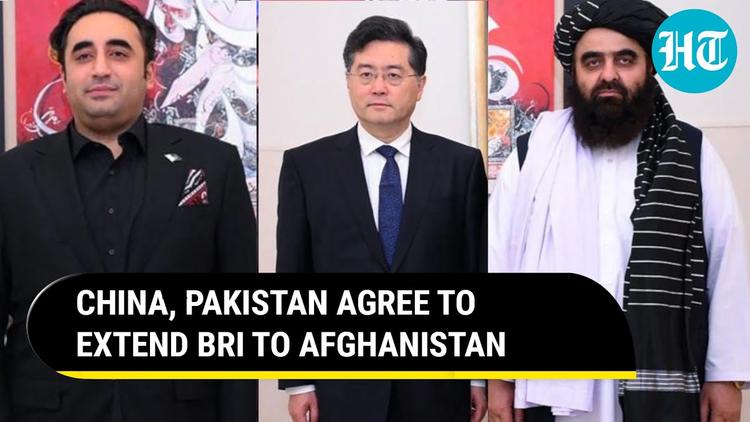By Abubakar Siddique | –
( RFE/ RL ) – China has played a visible role in Afghanistan since the Taliban seized power in 2021.
Beijing is among only a handful of countries to maintain a diplomatic presence in Kabul, where the Chinese ambassador regularly meets with Taliban officials.
There has also been a surge in Chinese traders visiting Afghanistan to explore business opportunities and ink deals.
The Taliban, meanwhile, has boasted of Beijing’s interest in expanding trade and investing billions of dollars in Afghanistan’s mining sector.
Last month, the hard-line Islamist group also announced the resumption of direct flights between Afghanistan and China after a three-year gap, saying it would help strengthen bilateral relations.
Despite the appearance that China and the Taliban are becoming allies, experts say the relationship is limited and largely transactional.
Experts say Beijing’s primary concern in Afghanistan is the threat posed by members of the Turkestan Islamic Party (TIP) — an Uyghur extremist group that Beijing blames for unrest in its western province of Xinjiang and refers to by its former name, the East Turkestan Islamic Movement (ETIM).
The Taliban has been accused of sheltering Uyghur militants and done little to alleviate China’s security concerns.
Policymakers in Beijing also continue to worry about instability spreading from Afghanistan into South and Central Asia, where China has significant economic and political interests.
Meanwhile, Beijing has provided only limited development assistance to Afghanistan and large mining projects backed by Chinese companies have failed to get off the ground.
“China is not a ‘friend’ of the Taliban and can be relied on only to pursue its national interest,” said Barnett Rubin, an academic and former adviser to the U.S. State Department on Afghanistan. “China’s economic engagement with Afghanistan is as much if not more about national defense than profit-seeking.”
‘Terrorist Forces’
During its rule in the 1990s, the Taliban allowed Uyghur groups to operate in Afghanistan and is believed to still have links with them.
Since the Taliban regained power, the Taliban has relocated Uyghur fighters from the northeastern province of Badakhshan, which is located along Afghanistan’s 76-kilometer border with China, in a bid to allay Beijing’s fears.
But China has demanded that the Taliban cut any ties with the militants and hand them over to Beijing. The exact number of Uyghur fighters based in Afghanistan is unknown, although experts believe they number in the hundreds.
“China’s top priority in Afghanistan by far is to persuade the Taliban to turn these militants over to China,” Rubin said.
If the Taliban refuses, then Beijing expects the group to keep the activities of the Uyghur militants “under strict surveillance and control,” Rubin added.
In April, China’s Foreign Ministry said in a statement that Beijing “hopes that Afghanistan will fulfill its commitment in earnest and take more effective measures to crack down on all terrorist forces.”
Rubin says Beijing’s fears that Uyghur militants have been integrated into the Taliban’s “military and terrorist structures” explain why China is eager to increase its diplomatic and economic engagement with the Taliban.
Hindustan Times: “China’s BRI to make Afghanistan entry via Pak; Beijing seeks Taliban’s help to fight terror”
“Chinese interests in the Afghan economy are likely about trying to incentivize the Taliban to cooperate on counterterrorism,” he said.
Economic Incentives
For the cash-strapped Taliban government, which remains internationally unrecognized, securing investment and economic assistance is seen as a top priority as it seeks domestic and international legitimacy.
The Taliban takeover triggered an economic collapse and aggravated a major humanitarian crisis, with international donors cutting crucial financial assistance to Afghanistan.
“Afghanistan’s economic catastrophe overshadows all other problems in the country,” said Hameed Hakimi, an Afghanistan expert at the Washington-based Atlantic Council think tank. “If the Taliban can demonstrate that they can deliver on the economy, their popularity and support will expand considerably.”
Beijing has faced criticism for its infrastructure projects in developing countries around the world, which Western officials have described as exploitative. But that has not put off the Taliban, which has actively sought Chinese investment in Afghanistan’s vast untapped mineral resources.
In April, the Taliban claimed that a Chinese firm was interested in investing $10 billion in lithium extraction, a project that it said would employ more than 120,000 Afghans.
“Afghans are looking forward to exploiting their lithium and other mining deposits for their benefit,” Shahabuddin Delawar, the Taliban’s minister for mining, said that month.
In January, the Taliban signed an oil-extraction contract with a Chinese firm. Under the deal, China’s Xinjiang Central Asia Petroleum and Gas Co is expected to invest up to $150 million during the first year. After three years, the amount is expected to increase to $540 million. The Taliban claims the project will provide around 3,000 local jobs.
But experts do not expect Beijing to invest heavily in Afghanistan, which lacks infrastructure and roads. Despite a dramatic increase in violence, the country is also still the scene of sporadic attacks by the Islamic State-Khorasan extremist group.
“The Taliban benefit from maintaining a relationship with the Chinese government and would also like to use it both as an insurance and leverage against Western nations,” Hakimi said.
Via RFE/ RL
Copyright (c)2022 RFE/RL, Inc. Used with the permission of Radio Free Europe/Radio Liberty, 1201 Connecticut Ave NW, Ste 400, Washington DC 20036.



 © 2024 All Rights Reserved
© 2024 All Rights Reserved